|
|
|
Sort Order |
|
|
|
Items / Page
|
|
|
|
|
|
|
| Srl | Item |
| 1 |
ID:
077743
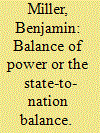

|
|
|
|
|
| Publication |
2006.
|
| Summary/Abstract |
The Middle East is one of the most war-prone regions in the international system. What is the most powerful explanation of the war-propensity of this region? I argue that neither realism nor liberalism are able to account for variations in regional war-proneness. Instead, I advance an alternative explanation based on the concept of the state-to-nation balance in the region. This balance refers to the degree of congruence between the division of the region into territorial states and the national aspirations and political identifications of the region's peoples. The balance also refers to the prevalence of strong versus weak states in the region. Thus, I explain the Middle East's high war-proneness by focusing on its relatively low level of state-to-nation balance. This imbalance has led to a powerful combination of revisionist ideologies and state incoherence. While other regions suffer from state incoherence, powerful revisionist nationalist forces, notably pan-nationalist and irredentists (the "Greater State"), aggravate this problem in the Middle East. These revisionist forces are often transborder and are especially powerful in the Middle East because of the high degree of external/transborder incongruence in comparison with all other regions. The combination of nationalist revisionism and state incoherence has made the Middle East more prone to violence than most other regions
|
|
|
|
|
|
|
|
|
|
|
|
|
|
|
|
| 2 |
ID:
087932
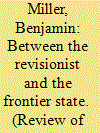

|
|
|
|
|
| Publication |
2009.
|
| Summary/Abstract |
This article explains variations in state war-propensity. I introduce a new typology of state war-proneness based on four major types of states: revisionist, failed, frontier, and status quo. The major novel contribution of this essay is the argument that the combined effect of variations in the extent of success in state-building (strong or weak states) and nation-building (nationally congruent or incongruent) shapes the level and the type of state violence by producing different categories of states with regard to their war-propensity. Strong states but nationally incongruent generate revisionist states, which initiate aggressive wars. The combination of state strength and national congruence leads to a status quo state. Weakness and incongruence bring about civil wars and foreign intervention in 'failed' states. Weakness but congruence produce the 'frontier state' with boundary and territorial wars, but also with a reasonable likelihood of evolution of status quo orientation over time. I focus here on key examples of these types of states, especially from two regions: Iraq and Lebanon in a highly war-prone region - the post-World War II Middle East; and Argentina and Brazil in a more peaceful one, at least in the 20th century - South America, although these states experienced quite a number of wars in the 19th century.
|
|
|
|
|
|
|
|
|
|
|
|
|
|
|
|
| 3 |
ID:
095497


|
|
|
|
|
| Publication |
2010.
|
| Summary/Abstract |
This article focuses on a fourfold distinction among international relations approaches to security and peace (offensive realism, defensive realism, defensive liberalism and offensive liberalism), which is applied to understand differing regional dynamics of conflict resolution, particularly in two key regions: Europe and the Middle East. The shift from realist to liberal assumptions, it is argued here, is the foundation for conflict resolution. The combined effect of the realist mechanisms produced 'cold peace' in Europe, while the liberal strategies warmed the peace considerably, eventually producing a 'high-level warm peace'. More specifically, it was overlooked offensive liberal mechanisms which made an especially major contribution to the emergence of warm peace on the continent through the successful imposition of democratization on the key state for European security, Germany. Defensive liberal strategies then played a very useful supportive role in warming the regional peace. In the Middle East, in contrast, some of the conditions for the application of the realist approaches emerged after the 1973 war, and even then only in the Israeli-Egyptian context, and somewhat more broadly after the end of the Cold War and the 1991 Gulf War. But the conditions for liberal strategies are still missing even though a defensive liberal strategy has been tried in the l990s and an offensive liberal strategy was applied since 2003. Thus, only a cold peace could emerge, and even that only partially due to the relative weakness of the realist mechanisms in the Middle East in comparison to the Western European case during the Cold War.
|
|
|
|
|
|
|
|
|
|
|
|
|
|
|
|
| 4 |
ID:
118154


|
|
|
|
|
| Publication |
2012.
|
| Summary/Abstract |
Does democratization pacify states-and thus their respective regions-or does it make them more war-prone? This is both a theoretical issue within the literature on democracy and peace, and an empirical issue, as in some regions democratization led to peace and in others it resulted in violence. To answer the posed question, this study probes the "state-to-nation balance" model as it makes the preliminary argument that democratization is not the underlying cause of either large-scale violence or peacemaking. Democratization, thus, is at best an intervening variable and in some cases has no major effects on war and peace. Rather, it is the state-to-nation balance model that better explains the war- and peace-proneness of states and regions. For an exploratory probe of this argument, the study examines Germany and Iraq-two key powers in their respective regions-and the changes they have gone through since World War I until today. The paper shows that when democratization takes place within a state-to-nation balance, it tends to have stabilizing effects and warms the peace. In contrast, within a state-to-nation imbalance, it is probable that democratization will have destabilizing effects.
|
|
|
|
|
|
|
|
|
|
|
|
|
|
|
|
| 5 |
ID:
097361


|
|
|
|
|
| Publication |
2010.
|
| Summary/Abstract |
This paper proposes a model for explaining shifts and variations in U.S. grand strategy. The model is based on a distinction between four ideal-type grand strategies or ideational approaches to security according to the objectives and means of security policy: defensive and offensive realism, and defensive and offensive liberalism. While the four approaches are continually present in the U.S. policy community, it is the combination of two systemic conditions-namely the distribution of capabilities and the balance of threat-that selects among the competing approaches and determines which grand strategy is likely to emerge as dominant in a given period. Great power parity is conducive to realist approaches. In contrast, a situation of hegemony encourages the emergence of ideological grand strategies, which focus on ideology promotion, according to the ideology of the hegemon. In the case of a liberal hegemon, such as the United States, liberal approaches are likely to emerge as dominant. In addition, a relative absence of external threat encourages defensive approaches, while a situation of high external threat gives rise to offensive strategies. Thus, various combinations of these systemic factors give rise to the emergence of various grand strategies. This model is tested in two cases of the two most recent shifts in U.S. grand strategy following 1991. In accordance with the expectations of the model, a change in the distribution of capabilities with the end of the Cold War made possible a change from realist to liberal strategies. In the benign environment of the 1990s the dominant strategy was defensive liberalism, while the change in the balance of threat after 9/11 gave rise to the grand strategy of offensive liberalism.
|
|
|
|
|
|
|
|
|
|
|
|
|
|
|
|
| 6 |
ID:
180366


|
|
|
|
|
| Summary/Abstract |
How did the attempt to make the world more liberal end up making the West less liberal? Following the end of the Cold War the US tried to promote liberalism in various parts of the world. This promotion took place under the liberal belief in its universality. A few of these attempts succeeded, most notably the integration of China into the global economy. Many other liberalizing endeavours failed, notably democracy-promotion in China, Russia and the Middle East. Yet, both the successes and the failures resulted in the rise of illiberal elements in the West as reflected in Brexit and Trumpism. The article shows how the outcomes of the attempts at liberalization—both the failures and the successes—generated these populist forces. The Chinese economic success took place at least partly because of the US-led integration of China into the international order. Yet, this success produced adverse economic effects in the West. Such outcomes led to the rise of economic populism. The American liberal interventions in the Middle East affected the rise of terrorism and of Muslim migration to the West. These developments influenced the rise of cultural populism in the West, which advances resentment of foreigners, migrants and minorities.
|
|
|
|
|
|
|
|
|
|
|
|
|
|
|
|
| 7 |
ID:
097094
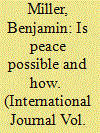

|
|
|
| 8 |
ID:
160062
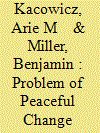

|
|
|
|
|
| Summary/Abstract |
In this paper, we examine the perennial problem of peaceful change (how to bring about a change in the status quo by means other than war?) by reflecting on the post-Cold War order from 1991 to 2017. We examine the problem at three different levels of analysis: systemic (great power interactions), interactive (peaceful territorial change), and domestic (democratization efforts). At the interactive level, we assess the record of successes and failures of peaceful territorial changes since 1991 to the present. At the systemic level, we assess the inherent difficulties embedded in systemic peaceful change (the decline of the US hegemony, the rise of China, the revival of Russia?). At the domestic level, we focus upon democratization efforts. In this context, we particularly emphasize the contours of the emerging illiberal international order in keeping peace and the status quo, bringing war, or facilitating the possibility of peaceful change. Finally, we suggest possible links between domestic, interactive, and systemic peaceful change, and suggest an agenda for future research.
|
|
|
|
|
|
|
|
|
|
|
|
|
|
|
|
| 9 |
ID:
113619


|
|
|
|
|
| Publication |
2012.
|
| Summary/Abstract |
This article addresses the following two questions: First, how does the United States (US) manage regional war and peace, especially in the Middle East (ME)? It will show that the strategies the US has adopted in conflict management in the ME over the last several decades have shown considerable variations, both in the goals of its involvement - between trying to shape the regional balance of power and to reorder the domestic regimes in the regional states, and in the means of involvement - between a unilateral and a multilateral strategy. Second, it seeks to explain these variations in the US regional patterns of involvement.
|
|
|
|
|
|
|
|
|
|
|
|
|
|
|
|
| 10 |
ID:
031592
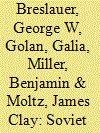

|
|
|
|
|
| Publication |
Boston, Unwin Hyman, 1990.
|
| Description |
xvi, 320p.
|
| Standard Number |
0044452322
|
|
|
|
|
|
|
|
|
|
|
|
Copies: C:1/I:0,R:0,Q:0
Circulation
| Accession# | Call# | Current Location | Status | Policy | Location |
| 031474 | 327.47056/BRE 031474 | Main | On Shelf | General | |
|
|
|
|
| 11 |
ID:
081096
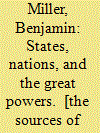

|
|
|
|
|
| Publication |
Cambridge, Cambridge University Press, 2007.
|
| Description |
xviii, 500p.
|
| Series |
Cambridge studies in international relations
|
| Standard Number |
9780521691611
|
|
|
|
|
|
|
|
|
|
|
|
Copies: C:1/I:0,R:0,Q:0
Circulation
| Accession# | Call# | Current Location | Status | Policy | Location |
| 053209 | 327/MIL 053209 | Main | On Shelf | General | |
|
|
|
|
| 12 |
ID:
065718


|
|
|
|
|
|
|
|